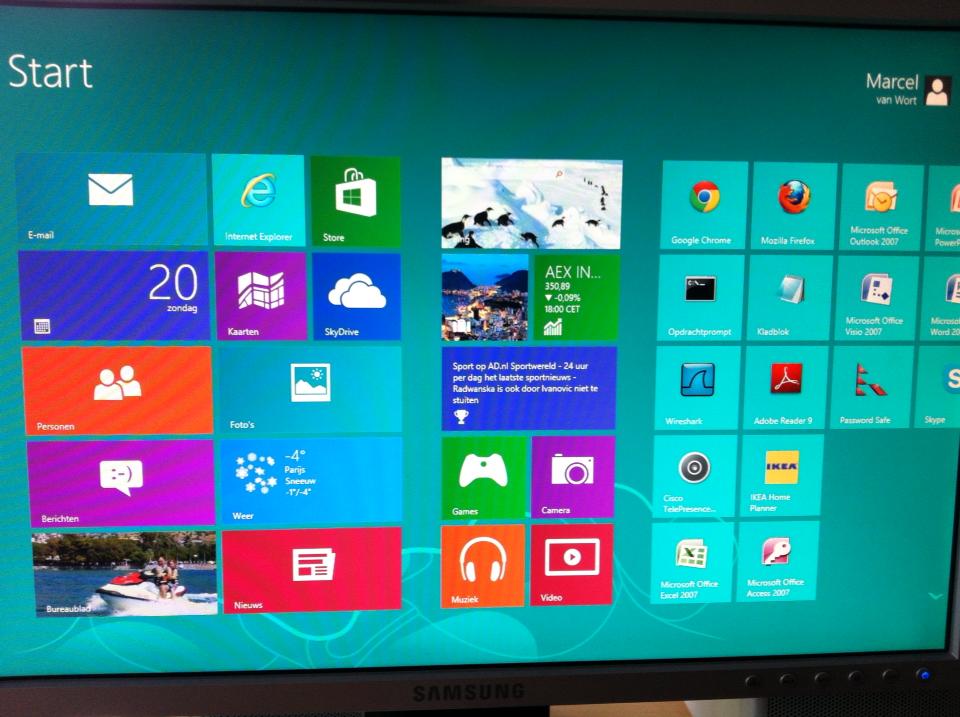Recently Microsoft warned their Windows 7 users that they will increase their license pricing for Windows 8 upgrades after January 31st. So kind of pushed by this threat I decided to upgrade my home desktop to Windows 8 for the friendly price of €29,95 while it was still possible.
Besides this attempt to save money, I do not know what came into me to say goodbye to a good working Windows 7 machine. Especially because I had some biased aversion towards the new Windows 8 user interface. Probably it was my uncontrollabe curiosity that finally decided to change my desktop into a gigantic telephone which is actually true as I use my desktop as IP phone too.
browsers in the new Windows user interface: it feels old

While playing with my new user interface, I noticed that the old desktop environment can still be used but it is kind of hidden between the large icons of the main apps on the new desktop. With all those apps for the most important applications available it is inevitable that the old desktop and the three browsers I use in there (IE, FF and Chrome) are hardly used.
apps versus browsers: the dice are loaded
In case a website released an app it is very likely you will start the app instead of a browser to reach its content, just like on your phone. From the perspective of the new interface it is a fact now that websites that have no app developed, are forcing their users to use the “old” desktop environment and a piece of extra software; “the browser”.
This way the trusted browser has been “degraded” to a multipurpose terminal window needed to view “old-fashioned” content on the internet. Something like the old 3270 terminal emulators from the past.
apps are better than Websites and here's why
No organisation that offers content on the Internet wants to be seen as an old-fashioned dinosaur and they want their users to reach them on every platform. That’s why they develop apps as quick as they can which cause their users to stay away from their trusted browsers.
Apps have the advantage that they do not have to stick to strict rules like web browsers. This way the communication between apps and servers can be done much more effective than using chatty and inefficient protocols like HTTP transmitting many different objects across for each page. As the site layout already exists within the app code on the client, only raw data has to be sent across which saves bandwidth usage and improves user experience.
A developer does not have to meet the minor compatibility issues between the different browsers and have multiple instances of one site online. A good working site is not dependent anymore on the compatibility of a browser that needs to be multifunctional, able to use all kind of portable code and able to interpret the html code on the site rather than the quality of the app and the server code alone.
I must admit that some apps can be better programmed as well and in some cases may not be effective too but then again the browser is losing this battle because of its need for multi functionality and strict rules.
more than killing browsers, apps change the Internet
For content suppliers, apps have another big advantage as they are changing the business model on the Internet in a way that is hard to do when using multipurpose browsers.
Site or portal users can now be charged and registered when they buy an app for their site. This way the content supplier is able to reach a closer relationship with their customers and more important; it gives them a means to bind their customers. By pushing messages directly to their desktop even if they have not been visiting their websites, the suppliers can remind their users to come back for more content or services.
Many cloud services use browsers to publish their applications to their users. However, those applications are restricted by the rules that browsers need to operate. In this case also, customised apps and server communications have the potential to improve user functionality and effectivity for cloud services big time.
conclusion
I really wonder how long it will take before the big content suppliers and cloud service providers “switch off” their HTML-based browse environments and consequently kill the multipurpose browsers we have been used for decades?
Does the web browser have a future or will it become a terminal emulator for legacy applications?
Marcel
photo credit: rudall30 - fotolia.com

Marcel is the Managing Consultant specialized in Information Security and Green IT at Orange Business with more than three decades of experience in ICT. He is an active member of the Orange Green Act program committed to achieve Green IT, sustainability and CSR goals at Orange Business and help our customers with their digital sustainability transition. Marcel likes mountain biking and is on a mission to develop ways to use CO2-neutral bio-fuels in motorsports while racing the Dakar Rally 2023.